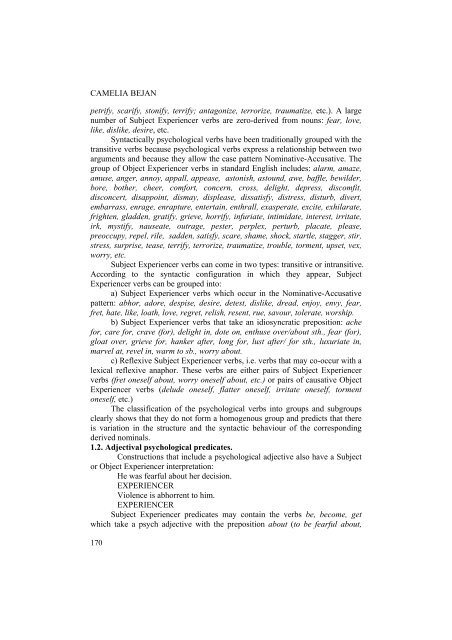culture, subculture and counterculture - Facultatea de Litere
culture, subculture and counterculture - Facultatea de Litere
culture, subculture and counterculture - Facultatea de Litere
Create successful ePaper yourself
Turn your PDF publications into a flip-book with our unique Google optimized e-Paper software.
CAMELIA BEJAN<br />
petrify, scarify, stonify, terrify; antagonize, terrorize, traumatize, etc.). A large<br />
number of Subject Experiencer verbs are zero-<strong>de</strong>rived from nouns: fear, love,<br />
like, dislike, <strong>de</strong>sire, etc.<br />
Syntactically psychological verbs have been traditionally grouped with the<br />
transitive verbs because psychological verbs express a relationship between two<br />
arguments <strong>and</strong> because they allow the case pattern Nominative-Accusative. The<br />
group of Object Experiencer verbs in st<strong>and</strong>ard English inclu<strong>de</strong>s: alarm, amaze,<br />
amuse, anger, annoy, appall, appease, astonish, astound, awe, baffle, bewil<strong>de</strong>r,<br />
bore, bother, cheer, comfort, concern, cross, <strong>de</strong>light, <strong>de</strong>press, discomfit,<br />
disconcert, disappoint, dismay, displease, dissatisfy, distress, disturb, divert,<br />
embarrass, enrage, enrapture, entertain, enthrall, exasperate, excite, exhilarate,<br />
frighten, glad<strong>de</strong>n, gratify, grieve, horrify, infuriate, intimidate, interest, irritate,<br />
irk, mystify, nauseate, outrage, pester, perplex, perturb, placate, please,<br />
preoccupy, repel, rile, sad<strong>de</strong>n, satisfy, scare, shame, shock, startle, stagger, stir,<br />
stress, surprise, tease, terrify, terrorize, traumatize, trouble, torment, upset, vex,<br />
worry, etc.<br />
Subject Experiencer verbs can come in two types: transitive or intransitive.<br />
According to the syntactic configuration in which they appear, Subject<br />
Experiencer verbs can be grouped into:<br />
a) Subject Experiencer verbs which occur in the Nominative-Accusative<br />
pattern: abhor, adore, <strong>de</strong>spise, <strong>de</strong>sire, <strong>de</strong>test, dislike, dread, enjoy, envy, fear,<br />
fret, hate, like, loath, love, regret, relish, resent, rue, savour, tolerate, worship.<br />
b) Subject Experiencer verbs that take an idiosyncratic preposition: ache<br />
for, care for, crave (for), <strong>de</strong>light in, dote on, enthuse over/about sth., fear (for),<br />
gloat over, grieve for, hanker after, long for, lust after/ for sth., luxuriate in,<br />
marvel at, revel in, warm to sb., worry about.<br />
c) Reflexive Subject Experiencer verbs, i.e. verbs that may co-occur with a<br />
lexical reflexive anaphor. These verbs are either pairs of Subject Experiencer<br />
verbs (fret oneself about, worry oneself about, etc.) or pairs of causative Object<br />
Experiencer verbs (<strong>de</strong>lu<strong>de</strong> oneself, flatter oneself, irritate oneself, torment<br />
oneself, etc.)<br />
The classification of the psychological verbs into groups <strong>and</strong> subgroups<br />
clearly shows that they do not form a homogenous group <strong>and</strong> predicts that there<br />
is variation in the structure <strong>and</strong> the syntactic behaviour of the corresponding<br />
<strong>de</strong>rived nominals.<br />
1.2. Adjectival psychological predicates.<br />
Constructions that inclu<strong>de</strong> a psychological adjective also have a Subject<br />
or Object Experiencer interpretation:<br />
He was fearful about her <strong>de</strong>cision.<br />
EXPERIENCER<br />
Violence is abhorrent to him.<br />
EXPERIENCER<br />
Subject Experiencer predicates may contain the verbs be, become, get<br />
which take a psych adjective with the preposition about (to be fearful about,<br />
170












